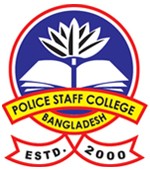Counter Terrorism: A Call for Seizing Terrorist Activities- Special Course for the SP
Terrorism in the contemporary International Security Studies needs a huge area of analysis while a considerable incompetence and ignorance over this study have been noticed especially in this South Asia region. This enforces a more thoughtful and insightful accounts of the authentic scholarship. Due to the recent escalation of the threats of terrorism across the world, academics and policy circles give special emphasize on this issue.
Bangladesh Police also are struggling with countering terrorism. They grapple with a series of problems including a less amount of expertise on the topic. Considering such limitations, the Inspector General of Bangladesh advised PSC to take efforts on designing a course on this particular topic to efficiently and effectively address this problem. In this backdrop, in 2016, PSC has launched its new course with a duration of 5-day long course on ‘Counter Terrorism: A Call for seizing Terrorist Activities’ for the participants in the rank of Superintendents of Police.
This course placed terrorism and the efforts at counter-terrorism in the context of national and international violence. The aim of this course is to acknowledge the entire spectrum of violence (peaceful and non-violent protest through to large scale extremism) which acts as a catalyst for terrorism. The focus of this course is on understanding the nature and dynamics of terrorism which derives from religious fanaticism.
Course objectives:
Through the training program, the participants will be able to-
► Understand the global, regional and national perspectives of terrorism
► Demonstrate better skills in developing strategies to counter terrorism
► Reciprocate in terms of sharing critical intelligence on terrorism
► Plan and coordinate efforts to combat terrorism within and beyond national perspectives
► Enhance scopes for inter-agency operational cooperation to deal with terrorist activities
► Raise appropriate investigative capacity to deal with cases relevant to terrorist activities.
► Identify gaps between theory and practice in the field of terrorism
► Identify the route maps of terrorist financing and develop tools to tackle the flow of such finance.
► Widen frontiers of related legal knowledge (law, rules, regulations, strategies etc.)
Expected learning outcomes:
► Better understanding of approaches to combat terrorism.
► Enhanced inter and intra organizational cooperation
► Increased ability to determine the appropriate and effective strategies in management of terrorist activities.
► Strengthened intelligence network, proactive measures in dealing with terrorism.
► Raised capacity in developing counter terrorism strategies Greater success in identification and address of Transnational Organized Crime trend
Course on Research Methodology
Bangladesh Police faces crucial challenges in creating, nurturing and maintaining the level of quality research in social science areas. Hence, there is a need to develop a sound methodological base of research among growing researchers to cope-up with future challenges. A good research methodology is a key to sound research output. To operationalize this vision, there is a need to train, reorient and reactivate the research scholars in social science on research methodology.
The course on Research Methodology is an effort to enrich the research scholars in social science research methodology. It covered the basics of research methodology focusing on theoretical and practical inputs. Specifically the formulation of research problem, generating research hypothesis and testing hypothesis, conducting literature review, data collection methods, selection of appropriate parametric or non-parametric statistical method for analyzing data and report writing.
Course Objectives:
1. To enable the participants to define research problem, develop an approach to research problem and select a suitable design.
2. To impart capabilities for formulation and testing of hypothesis based on the nature of research.
3. To enable the participants to understand report writing and writing research proposals.
4. To make aware the participants about latest trends in social science research discipline.
Expected Outcome:
After completion of this course, the participants can able to develop
1. Independent research skill
2. Critically review the research article
3. Have sufficient knowledge to problem identification and research question generation
4. Be acquainted with data generation, data management techniques and different ways of data analysis.
5. Have necessary skills on methods of writing research proposal
6. Be aware on plagiarism and how to maintain academic honesty and ethics
7. Gain knowledge on the importance of citation and be familiar with different citation systems

